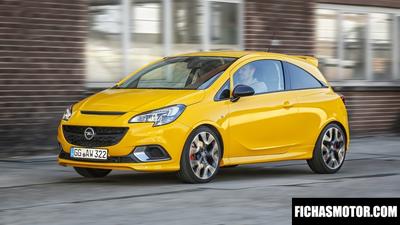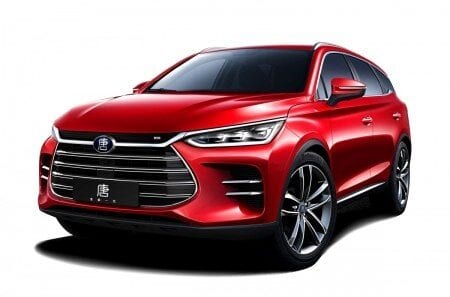
Opel Corsa 1.6 Turbo ECOTEC OPC
The list of contributors to the Corsa OPC project is interesting: seats were provided by Recaro, Brembo brakes, a Remus exhaust and a chassis (which adjusts the damping power to the vehicle's frequency) by Koni. But a car is much more than the sum of otherwise recognized sports equipment brands, so it's important to look at the whole thing. Not just to look, but to feel, to experience. The exterior is almost too restrained, not least because we're talking about an OPC version that wants to evoke emotion and put a wolf to sheep at the wheel.
If it weren't for the large rear spoiler and 18-inch alloy wheels that reveal more than Brembo brake calipers, we probably would have missed it on the road. Remember your predecessor? With a single end of a triangular tailpipe in the middle of a (pretty) diffuser and additional bumper slots, it has shook a lot of heads, and now the two large tailpipe ends on almost each side of the car are almost invisible. A similar story in the cabin: if it weren't for the shell-shaped Recaro seats, the OPC lettering on the sills, gauges and gear lever probably wouldn't have been noticed. This is why there is still a lot of work to be done in this direction at the Corsa OPC, although I think some drivers just want an unobtrusive car. Well, unobtrusively until you press the gas pedal! OPC versions have always been renowned for their powerful engines, and the new Corsa is proud to continue that tradition.
What's more: if we praised the drivetrain in the Fiesta ST and the road position in the Clio RS Trophy, then the Corsa definitely comes first with the engine. The 1,6-liter turbo alone is really good, as it loves to run at low revs and approaches the red field with enthusiasm. Our measurements show that the output speed when accelerating to 402 meters from the city was almost the same as the Clio RS Trophy with top quality summer tires! With its help, you can safely circle around the city or get into a turn on the race track, as if the car were stolen. That said, it serves up with a pleasant buzz, although we missed such a pleasant crackle of the exhaust pipe when shifting gears.
The gearbox is precise, maybe it could be even sportier, therefore with shorter gear lever strokes. But the possibility that you can completely disable the stabilization electronics, manual transmission and classic parking brake is more than tempting on the first snow. You know what we're talking about, don't you? The test Corsa OPC also included the so-called OPC Performance Pack, which includes the aforementioned 330mm front discs with Brembo brake calipers, 18-inch wheels with powerful 215/40 tires, and even a Drexler-branded mechanical partial lock. This means that the lock works independently of the work of the stabilization system (athletes often have the so-called electronic partial differential lock, which works when ESP is on, but if you turn it off, for example, turn on the race track or an empty snow-covered parking lot, the system does not work, which is complete nonsense ), which is also felt on the steering wheel. Therefore, when fully accelerating from a corner, you need to hold the steering wheel tighter than if you were driving a racing car, otherwise you will soon find yourself in the nearest ravine.
I can't even imagine driving on cold, wet and slippery roads in Ljubljana without locking up, as the engine loves to put the front drive wheels in neutral even when you just want to get to work safely. Otherwise, the Corsa OPC is a very power hungry machine, and with moderate gas from a friend, you can easily pretend it's just a slightly sportier version, because then you won't feel any steering breaks or powerful brakes, only the chassis is a bit stiffer. It is in the chassis that we will take a step back and admit that we dare not say how good it is compared to the Fiesta (a convincing winner of our small athlete comparison test a few years ago) and the Clio, which is known as a benchmark for competitors. Winter tires are such a weak link in the chain called road position that we asked a Slovenian Opel dealer to test the car on summer tires and do three laps at Raceland for comparison. Unfortunately, we were refused, saying that the car is not for the race track.
Are you sure? Perhaps we could be a little more confident, as Renault, Mini and Ford, for example, have no problem with this since they believe in their product. Thus, we can conclude that the Corsa OPC certainly pleasantly surprised both the engine and partly with the transmission and predictable chassis, and most of all with a good mechanical differential lock. Be sure to buy the OPC capacity pack for 2.400 euros, you won't regret it!
Alyosha Mrak photo: Sasha Kapetanovich
Opel Corsa 1.6 Turbo ECOTEC OPC
Basic data
| Base model price: | 17.890 € |
|---|---|
| Test model cost: | 23.480 € |
| Power: | 154kW (210 KM) |
Costs (per year)
Technical information
| engine: | 4-cylinder - 4-stroke - in-line - turbocharged petrol - displacement 1.598 cm3 - maximum power 154 kW (210 hp) at 5.800 rpm - maximum torque 245 Nm at 1.900–5.800 rpm. |
|---|---|
| Energy transfer: | front wheel drive engine - 6-speed manual transmission - tires 215/40 R18 V (Bridgestone Blizzak LM-32). |
| Capacity: | top speed 230 km/h - 0-100 km/h acceleration 6,8 s - average combined fuel consumption (ECE) 7,5 l/100 km, CO2 emissions 174 g/km. |
| Mass: | empty vehicle 1.278 kg - permissible gross weight 1.715 kg. |
| External dimensions: | length 4.021 mm – width 1.736 mm – height 1.479 mm – wheelbase 2.510 mm – trunk 285–1.090 45 l – fuel tank XNUMX l. |
Our measurements
| Measurement conditions: T = -2 ° C / p = 1.028 mbar / rel. vl. = 58% / odometer status: 1.933 km | |
| Acceleration 0-100km: | 7,4s |
|---|---|
| 402m from the city: | 15,4 years ( 153 km / h) |
| Flexibility 50-90km / h: | 5,9s (IV) |
| Flexibility 80-120km / h: | 7,8s (V) |
| test consumption: | 10,3 l / 100km |
| Fuel consumption according to the standard scheme: | 7,3 l / 100km |
| Braking distance at 100 km / h: | 42,7m |
| AM table: | 40m |
| Noise at 90 km / h in 6rd gear | 61dB |
evaluation
The engine is impressive, the drivetrain could be faster, and the chassis is predictable thanks to the winter tires. Excellent for the classic differential lock, which is unfortunately an accessory.
We praise and reproach
engine
Recaro seats
mechanical partial differential lock
Brake brake
discreet appearance
fuel consumption
rigid chassis
we were not allowed to go with him to Raceland
